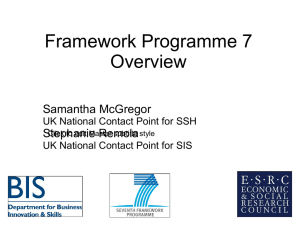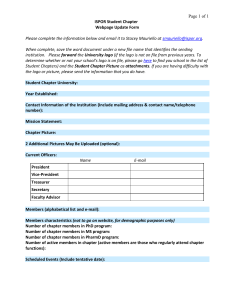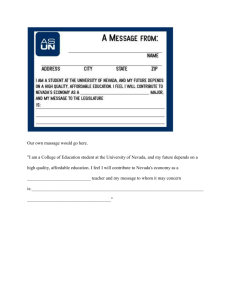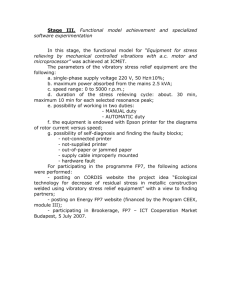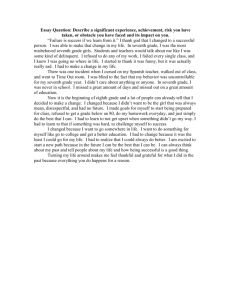Report on marketing concept
advertisement
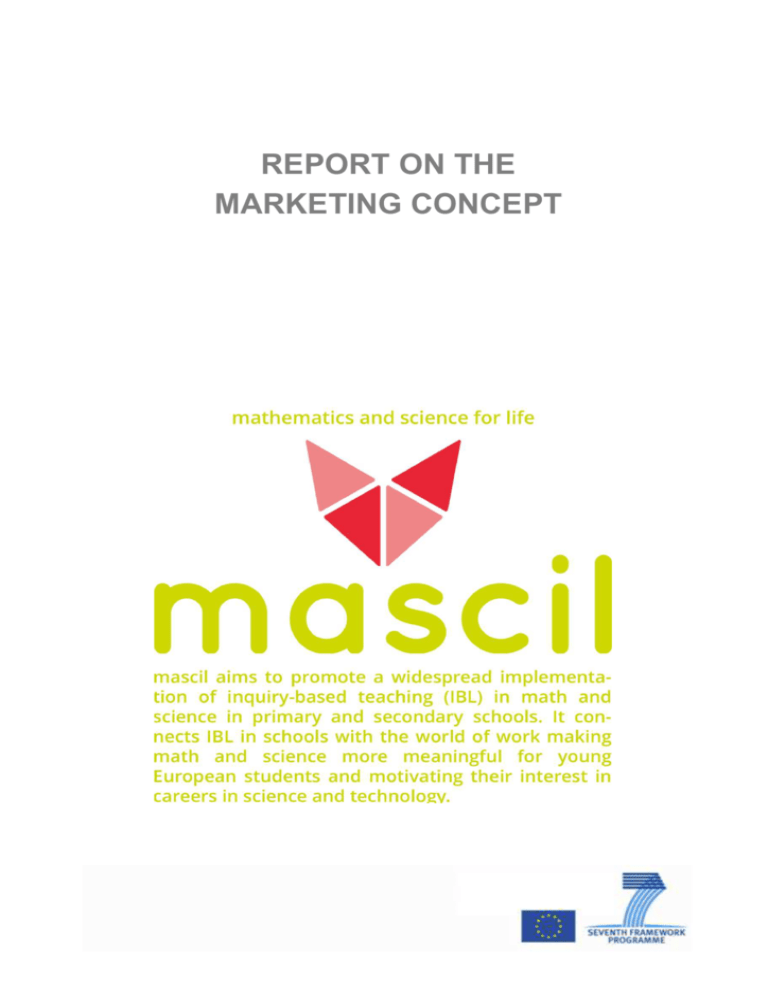
REPORT ON THE MARKETING CONCEPT 2 Project Information Project no. 320693 Project acronym: mascil Start date of project: 01/01/2013 Duration: 48 months Project title: mathematics and science for life Dissemination level Thematic Priority: Science in Society Funding scheme: FP7 Information about the deliverable Deliverable N° 6.1 Due date of deliverable: December 2013 Actual submission date: 19.12.2013 Deliverable title: REPORT ON THE MARKETING CONCEPT Contact Information Coordinator: University of Education Freiburg, Prof. Dr. Katja Maaß Lead partner for this deliverable: Gesine Kulcke Website: www.mascil-project.eu The project mascil has received funding from the European Union Seventh Framework Programme (FP7/2013-2017) under grant agreement n° 320693. 3 Table of Contents 1. Executive Summary ........................................................................................... 4 2. Main Report ......................................................................................................... 5 2.1 Logo ............................................................................................................... 10 2.2 Message ........................................................................................................ 13 2.3 International website ...................................................................................... 15 2.4 Social media .................................................................................................. 20 2.5 National websites ........................................................................................... 22 2.6 Leaflets .......................................................................................................... 22 2.7 Press work ..................................................................................................... 25 3. Conclusions and Recommendations .............................................................. 29 4. References ........................................................................................................ 30 The project mascil has received funding from the European Union Seventh Framework Programme (FP7/2013-2017) under grant agreement n° 320693. 4 1. Executive Summary The marketing concept is supposed to support the activities of mascil (mathematics and science for life), promoting and informing about inquiry-based teaching and learning in mathematics and science connected to the world of work. The marketing concept is primarily aiming at getting teacher educators and teachers motivated to participate in professional development courses, since they are expected to be the most important actors in promoting a change in the way mathematics and science is taught across Europe. To make a real change happen, however, groups supportive of teachers also need to get engaged. It is therefore additionally planned to support mascil partners in dissemination activities they plan to reach and inform parents, students, school authorities, policy makers and media about inquiry-based-learning in connection to the world of work. Depending on the activities planned by the various countries, their target groups and aims – let it be conferences, educational fairs, exhibitions, parents’ nights, information days, workshops, open lessons, talent days or competitions for students – different means of marketing might be of interest as well as the use of different information channels like an international website, national websites, social media tools, the press, leaflets, posters, podcasts and video productions taking into account that a good marketing concept needs to “ensure that there are numerous opportunities to reach people and that the messages are communicated through many different media to which the publics have access.” (Gordon 2011: 46) The marketing of mascil has to address a variety of target groups in 13 different countries, taking into account various interests, needs, obstacles and favors of teacher educators, teachers, students, parents, stakeholders and the media. Additionally, different school systems, curricula, conditions, different mentalities and languages have to be acknowledged, making it necessary to have a flexible bottom-up-concept supporting ideas and intentions of the various countries instead of a general top-downmarketing concept. The project mascil has received funding from the European Union Seventh Framework Programme (FP7/2013-2017) under grant agreement n° 320693. 5 A flexible concept will facilitate marketing on the spot, since it is on the spot where teachers need to be encouraged to take part in professional development offers. It is on the spot where school authorities need to be convinced of the need to promote inquirybased learning connected to the world of work at their schools. And it is on the spot, meaning at the various schools, where students – at best supported by their parents should get engaged in inquiry-based tasks connected to the world of work. For the successful promotion of conferences, parents’ nights, students’ competitions or teacher trainings national websites and leaflets written in the languages the target groups speak are therefore of primary importance; at best activities will also be announced by the use of social media tools like Twitter and in the local press. Accordingly, the marketing concept for mascil is focused on inspiring and supporting dissemination activities taking place in the various countries by offering layout suggestions and materials as well as producing material the partners ask for to professionalize the look of the material they hand out. A further focus is put on the coaching of national marketing efforts, including the production of content for the international and national websites, working with the press and using social media tools: “Practitioners must explore and experiment with new technologies and new ways of thinking to get their message across and interact with publics – in an environment which has been made far more transparent, due to social media. For example, the number of Twitter users reached 75 million by the end of 2009 and is still growing” (Gordon 2011: 76). 2. Main Report In the course of developing a marketing strategy tailored to the needs of the different target groups of interest we identified means to reach the different target groups and set up the following: a logo and an international website as well as a clear message which is supported by a key visual illustrating the idea of mascil. The project mascil has received funding from the European Union Seventh Framework Programme (FP7/2013-2017) under grant agreement n° 320693. 6 We set up a twitter account which may be followed by further social web tools the mascil partners want to actively use, a RSS-Feed, a newsletter, as well as a template for the national websites, a template for PowerPoint presentations and a template for leaflets promoting mascil offers and activities addressed to teachers. We will add to these further templates for leaflets, academic posters and other matters the various partners ask for in the course of the project. To support the generating of content we offer workshops at the mascil conferences like done in Crete this December, where we present criteria for the production and selection of content and ways of publishing it as well as guidelines on how to work with the press. To support the marketing activities taking place in the various countries we packed a logo package including files making the partners capable of using the logo on any possible online and printing matter. Along with it goes a logo manual explaining how to use the different logo files. Based on the logo design are the layout of the international website as well as the templates and layout suggestions for the national websites, PowerPoint presentations, leaflets, etc. The international website www.mascil-project.eu gives background information on the project, informs about the philosophy of inquiry-based learning connected to the world of work, and is regularly updated with reports on mascil activities taking place in the various countries. The regular updates not only make regular revisits of the site worthwhile, but improve the Google ranking of the site. The project mascil has received funding from the European Union Seventh Framework Programme (FP7/2013-2017) under grant agreement n° 320693. 7 The international website also functions as a platform for the mascil partners, informing them about activities taking place within mascil but outside their country. It improves the communication within the project since the featuring of content submitted by a partner may give other partners new ideas for further own activities as well as for the production of content they can put on their national websites. Before starting to plan activities and their marketing, it is necessary to focus on the target groups and the aims of the project. At the Kick-off Meeting everyone was invited to join in a brainstorming to sensitize for the target groups of the project and to get an idea of what the partners think to be relevant concerning the definition of their target groups. Inspired by Maslow’s hierarchy of needs - Maslow researched on how people are motivated by different levels of needs (see Gordon 2011: 68) - the following questions were posed: 1st question: How would you define the target group teachers, taking into account their needs, their interests and motivation, their values, their missions and obstacles in life? Responses given: • • • • • • • • • • Teachers can be motivated by happy, active students and learning students. They want to ensure and improve their kids’ education. They want interesting and natural approaches and methods of instruction. Teachers feel bound by time limitations. There are constraints from content of curriculum. Teachers sometimes feel dictated by text books. They miss time to reflect. Teachers are short of time. Teachers want to provide teaching with a reliable tool. The teachers we are likely to be working with are interested in developing and enhancing their repertoire. • Teachers like to share experiences with other teachers. The project mascil has received funding from the European Union Seventh Framework Programme (FP7/2013-2017) under grant agreement n° 320693. 8 • • • • • • • • • • • • • They want to receive materials which they can use within their lessons. They are interested in learners’ outcomes linked to teachers’ performance. Teachers want to find means, resources and strategies to motivate students. The teachers’ new role as facilitators in the process of learning should be promoted and implemented. Teachers should attend the teacher trainings. Teachers’ values: students have to be prepared well for exams. The curriculum should be covered. Teachers are suspicious to drastic changes. Students have to be motivated. Teachers see the need for change. They want to get students motivated and engaged and enhance learning. Professional development should take place during working hours. Teachers want more engaging activities for their students. 2nd question: How would you define the target group parents, taking into account their needs, their interests/motivation, their values, their missions and obstacles in life? Responses given: • • • • • • • • They can be motivated with products created by their kids. They want to prepare their children for the world of work in the best way possible. They are interested in getting their children prepared for life. Parents are often critical toward non-traditional teaching strategies. Parents want what is best for their kids now and in the future. Some parents want to understand what and how students learn in school. Obstacle: parents own school experiences and beliefs. Values: Parents do not care about science because they do not think it is important for their children’s future profession. So it is important to show mascil’s importance/impact of/to future professional development. The project mascil has received funding from the European Union Seventh Framework Programme (FP7/2013-2017) under grant agreement n° 320693. 9 • Parents want to know: Do the teaching methods contribute to good decisions of their children? • Parents want the best for their children’s future. • Parents are motivated by children’s difficulties, children’s enthusiasm and interest, opportunities offered to contribute to projects meeting their values. • What links all parents is that they care about their children; they want the best for them. • I need school evaluation of my children with best grades. • Values: education and higher education, success in life. • Mission: support their children. • Motivation: their children’s success. • Parents could be made supportive for mascil, if they understand that IBL offers better starting positions in knowledge based society. 3rd question: How would you define the target group students, taking into account their needs, their interests/motivation, their values, their missions and obstacles in life? Responses given: • • • • • • • They need opportunities for self-expression and self-knowledge. Students don’t really care about research problems and programmes. They are missing a perspective to work in science and technology. Values: fairness, equal participation. Motivation: communication with their peers, enjoyment. Motivation: informal learning. Motivate them by providing space to show their capabilities, reflect their interests and preferences in autonomous work and approaches to learning. • They want interactive lessons. • They want links to their world. • Tasks are to make sense. The project mascil has received funding from the European Union Seventh Framework Programme (FP7/2013-2017) under grant agreement n° 320693. 10 • • • • • • Awe and wonder. Pupils like to have fun and engage. Main motivation: good grades in subject and to pass exams. Secondary school students are sometimes really bored with mathematics. Students want to contribute to the benefit of others/to society (altruistic/idealistic). Students are not a homogenous group. Differences in age lead to different interests. • Students could be attracted by involving them in the educational process by letting them experiment different hypotheses, reject conjectures, discover new knowledge on their own. • Values of students: please surprise us, we want to pass exams, our time (for school) is limited, the more interesting, the more we want to work for it. • Peer group is very important. Defining the target groups, as well as the purposes and messages of the project makes it possible to find out what marketing materials and information channels are useful. It makes it possible to decide on the content which should be presented as well as on the layout and suitable text formats. 2.1 Logo To give the partners a first impression of possible logo designs two sketches done by a graphic designer were presented at the Kick-off Meeting. These suggestions already took into account professional criteria. The most important were presented at the Kick Off, as there are: • A logo may not be too complex since it needs to be shown in all kinds of sizes: on a website, on a leaflet, on a visiting card, a letter or a poster. • Not all colors or combinations of colors are possible: the logo also has to work just in white or black. The project mascil has received funding from the European Union Seventh Framework Programme (FP7/2013-2017) under grant agreement n° 320693. 11 • The logo is the basis of the corporate design – everything else will be built upon it to achieve a corporate design. To reach a higher identification and ensure that all partners will use the logo on all materials they publish, they were invited to give feedback on the two suggestions: Comments made on these two sketches by the partners include the following: • • • • • • Origami idea is good, simple enough to be adapted to all kinds of material. Problematic to read in Slavonic languages: s –š. Both maths and science should be represented. Logo looks nice but too colorless. Maybe use the Primas colors? Logo should represent growth, development, building, construction of learning. A little bit boring since all letters are in black color – and also the font is too traditional. After evaluating the given input, we moderated a decision-making process taking into account the input as well as the professional criteria leading to an agreement on a logo at a meeting in Freiburg. A logo package with file formats needed to produce printing and online matters in any size was packed for every partner to use. It includes a colour positive, a colour negative, a monochrome positive and monochrome negative version as well as the logo with and without claim. Along with it goes a logo manual explaining the right use of the logo: The project mascil has received funding from the European Union Seventh Framework Programme (FP7/2013-2017) under grant agreement n° 320693. 12 The manual also clearly states the amount of red, green and blue the online colors of the mascil logo consist of as well as the amount of cyan, magenta, yellow and key (black) put together for printing matters: The project mascil has received funding from the European Union Seventh Framework Programme (FP7/2013-2017) under grant agreement n° 320693. 13 To professionalize the use of the logo among the mascil partners there are simple rules stated in the manual acknowledging design principles necessary to take into account: • • • • • 2.2 If you want to use the logo for printed matters: please take the files stored in the folder Print CMYK. If you want to use the logo online or in PowerPoint presentations: please take the files stored in the folder Web RGB. As a rule, always take a coloured logo. Logo with claim: Please use the logo with claim for depictions over 30 mm width, and the mini-logo with claim only for depictions below 30 mm width. Please make sure the logo always provides enough contrast to the background. Message The definitions of the target groups of mascil are the basis for finding a common agreement on a clear message taking into account the various interests of the target groups as well as cultural differences. At the Kick-off Meeting the partners were The project mascil has received funding from the European Union Seventh Framework Programme (FP7/2013-2017) under grant agreement n° 320693. 14 therefore asked to brainstorm messages addressing the target groups, among them were the following: • Mascil finally makes school an interesting place with an open window to your future. • Maths & science make sense. You will like it. • Get enthusiastic for mathematics and science. • Science – experience the real world! • The maths and science you always wanted to learn. • Discover the world! • Students will gain a deeper understanding – meaningful for their future. • Support your children in order to get motivated for mathematics and science. • Mathematics is meaningful, useful and fun. • Mascil is the shortest way to success in knowledge based society. • Do you want your child to be taught in a natural and scientific way? IBL provides this approach! • IBL can enhance students’ understanding of science & mathematics. • Mathematics is a window to the real world. • Mascil stretches minds! • Mascil enhances your children’s skills and understanding of problem solving/inquiry process. • Science and mathematics are important in everyday life. mascil is making this visible. • Mascil ensures that your children will prosper in mathematics and science. • Mascil has muscles. • Your children will profit from mascil! • Science and mathematics for your children’s life! The header of the international website features the message of the project selected from the suggestions made at the Kick-off Meeting. The proposal Discover mathematics and science for life has the great advantage of including the claim of mascil. Additionally, the term discover is an easy word, which is understood also by people who The project mascil has received funding from the European Union Seventh Framework Programme (FP7/2013-2017) under grant agreement n° 320693. 15 are not speaking English very well. The letters of Discover are built out of objects supporting the idea of mathematics and science being part not only of the world of work but of our everyday life. The message is also taken up in the layout for the newsletter as well as on some national websites. For those partners who asked for it the header of the international website was rebuilt with the message translated into their language. 2.3 International website Although there are countries lagging behind in accessing the internet – e.g. in 2011 54% of the Romanian people aged 16 to 74 years had never used the internet, 46% of the Bulgarians, 45% of the Greek people, and 41% of the people living in Cyprus and Portugal - special attention should be paid to online offers, since 63.5% of the European population is using the internet (www.newmediatrendwatch.com/regional-overview/103europe?showall=1). Strongly rising is the use of mobile devices which makes it important to develop offers for desktop, phone and tablet screens. The international website as the entrance to all online offers of mascil is therefore to be built so it can be used on various mobile devices. Belonging to the mascil online offers are the international website, the material platform offering teaching material for inquiry-based learning connected to the world of work and the teacher communication platform including a forum, a chat, a task repository, an elearning environment and a toolkit being set up for the use of professional development offered by the partners in the course of the project. The project mascil has received funding from the European Union Seventh Framework Programme (FP7/2013-2017) under grant agreement n° 320693. 16 All online offers are linked to each other but set up independently, making it possible to use different content management systems suiting the aims of the various online offers. So far, the international website is programmed in HTML and CSS, making it possible to develop it step by step according to the content the partners want to publish on the site as well as the functions the partners want the site to have in the course of the project before establishing a Content Management System with fixed functions. Orientated at a consistent arrangement taking into consideration the corporate design, a user-friendly navigation, a clear layout even with complex content structures including the option to build upon it, transparency and orientation, WP 6 built a wireframe to visualize a possible structure for a mascil website: The project mascil has received funding from the European Union Seventh Framework Programme (FP7/2013-2017) under grant agreement n° 320693. 17 Because of feedback given via e-mail by various mascil partners the wireframe was simplified at a meeting in Freiburg by keeping the naming of menu items to the point, reducing functions to get a clear and easy to grasp site, taking into account that functions and links should not be added before they are actively used and needed. After agreeing on what should be published to start with, WP 6 built a corresponding menu and sites which will be extended according to the material coming up during the course of the project. The creation of material for the website is supported by WP 6 which on a regular basis reminds partners to send in material in the course of their researching and activities. WP 6 edits, layouts and fits the material into the website to The project mascil has received funding from the European Union Seventh Framework Programme (FP7/2013-2017) under grant agreement n° 320693. 18 make it accessible for the determined target groups, taking into account the following criteria defining what is newsworthy: • • • • • Making it significant to the reader, Making it new, current and immediately relevant, Presenting it as something the public needs to know about, Positioning it as different or unusual, Justifying its appearance, giving weight to the story. (See: Gordon 2011) So far, notes and texts sent in by the Netherlands, Bulgaria, Germany and Greece were worked over by WP 6 to publish them on the website. To cover the meeting in Nottingham, WP 6 interviewed Vincent Jonker (Partner NL) who took part in the meeting. In a workshop offered at Crete the partners were encouraged to send in further material and equipped with the following criteria to be able to generate content suitable for the international website: Content which is of great interest are for instance cooperations with schools and companies because they illustrate the abstract idea of connecting inquiry-based learning to the world of work and can make it comprehensible. Possible content for the website are also reports on any other event or activity – let it be a professional development activity, a conference, a board meeting or a parents’ night. Interviews with teachers, parents and students who have taken part in activities or events present information from various perspectives and can thereby get various target groups interested in the information. Also new offers – for example online offers built up by WP 3, WP 5 or WP 9 – or research activities and results are interesting news for the target groups of mascil, since the project will not only be evaluated by teachers, students and parents directly profiting from mascil, but also by the media, policy makers, stakeholders and other researchers evaluating, discussing or deciding on mascil matters. The project mascil has received funding from the European Union Seventh Framework Programme (FP7/2013-2017) under grant agreement n° 320693. 19 For parents and students there should be built up online areas within the international website strictly offering content matching their interests. For students it could be an interesting offer to use their online area to publish their products developed within an inquiry-based learning setting connected to the world of work, making it possible to present the products to a real audience. Such an offer can, however, not start before teachers are in the phase of actively trying out mascil tasks in their classroom and needs students willing to publish their work. The index site offers information visitors are looking for the most. Those visitors will be in the beginning mainly teachers. Therefore little news boxes on the very top of the page may present among other things newly selected tasks from the classroom material offered by mascil, making a revisit of the site worthwhile. The complete layout of the first site is similar to a blog, supporting the idea of a site in progress. The right bar of the site is reserved for Web 2.0 tools. To show where the different partners come from, WP 6 built a map for the website in which the locations of all universities and institutes are marked. When clicking on one of the markers it is possible to see who is working with whom on what and how they can be contacted. The map allows a zooming right into the street where the institute is located: The project mascil has received funding from the European Union Seventh Framework Programme (FP7/2013-2017) under grant agreement n° 320693. 20 To cover an activity or event it is good to have pictures taken at the activity or event. For the website it is especially interesting to have pictures showing students or teachers engaged in learning situations illustrating the idea of mascil. For activities and events which illustrate the idea of mascil very explicitly – like a professional development taking place in a company - a professional photographer should be hired to cover the activity. 2.4 Social media WP 6 opened a Twitter account and invited every partner to do so as well, to be able to build an international Twitter team list, supporting the international character of the project. It also gives every partner a tool at hand enabling them to publish quick notes on steps taken in their country informing the public as well as updating and feeding WP 6 with topics for articles to be written for the website. WP 6 built a timeline and embedded it in the website so that all tweets published by the different partners are shown on it. Twitter is also an important tool to pull people to news published on the website, where they get in-depth stories and richer content than can be published with Twitter or other micro-blog postings. The mascil RSS feed embedded into the international website allows to subscribe to newly added articles, press releases and the newsletter. Users can subscribe to the mascil feeds by entering a feed's URL into a web-based, desktop-based or mobiledevice-based reader. The RSS reader checks the feeds regularly for new information and can automatically download it, if that function is enabled. Once users subscribe to it, the mascil site will automatically be checked for news. During the course of the project a mascil YouTube channel will be opened and embedded into the international site to promote video-based tasks as well as video documentations and spots being produced by the different partners throughout the project. YouTube is also of great interest to the marketing of mascil since: The project mascil has received funding from the European Union Seventh Framework Programme (FP7/2013-2017) under grant agreement n° 320693. 21 • • • • More than 1 billion unique users visit YouTube each month. 100 hours of video are uploaded to YouTube every minute. YouTube is localized in 61 countries and across 61 languages. YouTube is available on hundreds of millions of devices. (see: http://www.youtube.com/yt/press/statistics.html) If we produce spots or cartoons to promote mascil meant to be published on the international website as well as on YouTube, the needs according to the gratifications theory of Blumer and Katz (1974) - further developed by McQuail - should be taken into account: The spots being produced and uploaded should have the potential of entertaining and giving information, they may give guidance and advice, the spots may reinforce values or offer emotional release, and express lifestyles. “In order to attract attention viral videos need to be entertaining and have qualities that make them worth accessing when surfing the net.” (Gordon 2011: 81) Facebook has got: • • 1.19 billion monthly active users and 727 million daily active users on average in September 2013. (See: http://newsroom.fb.com/Key-Facts) We will therefore reflect on having a fan page set up for mascil. To be able to do so there needs, however, content to be generated by the various partners which might not be too easy for all of them as differences in country behaviours for social networks show (see: newmediatrendwatch.com/regional-overview/103-europe?showall=1). The project mascil has received funding from the European Union Seventh Framework Programme (FP7/2013-2017) under grant agreement n° 320693. 22 2.5 National websites There is a template suggesting a layout for the national websites, which will be set up and filled with content by the individual partners. All partners are invited to build upon the template according to their needs, using the content management system they prefer or their university uses so it stays easy to handle for everyone. The logo package and the manual going along with it is intended to help everyone setting up the right logo and colors for their websites. As for the international website, content of interest for the national website are articles on cooperations with schools and companies because they illustrate the abstract idea of connecting inquiry-based learning to the world of work. Of interest are reports on any event and activity taking place in a country: let it be professional development activities, conferences, meetings or parent’ nights. Along with a description of the activity the date as well as information on where it is possible to sign up for it should be published on the national website. Interviews with teachers, parents and students who have taken part in activities or events can present information from various perspectives and thereby get various target groups interested in the information. Also new offers or research activities and results are interesting news for the target groups of mascil, since the project will not only be evaluated by teachers, students and parents directly profiting from mascil, but also by the media, policy makers, stakeholders and other researchers evaluating, discussing and deciding on mascil matters. 2.6 Leaflets There will be different flyer templates with layout suggestions aiming at different target groups of mascil. The partners of mascil may take these templates to adapt and build upon them for their local activities and events. In progress is a template for a leaflet mainly addressing teachers: The project mascil has received funding from the European Union Seventh Framework Programme (FP7/2013-2017) under grant agreement n° 320693. 23 The template can be used to produce leaflets announcing the start of the professional development offers in the various countries in 2014 as well as for promoting mascil at the conferences the various partners plan to visit in 2014 (see 1.8: Press work). A first layout has been presented at the project meeting in Crete to start an agreement process taking into account the main needs of the various partners. The template includes an info graphic illustrating inquiry-based learning in connection to the world of work: The project mascil has received funding from the European Union Seventh Framework Programme (FP7/2013-2017) under grant agreement n° 320693. 24 The project mascil has received funding from the European Union Seventh Framework Programme (FP7/2013-2017) under grant agreement n° 320693. 25 Info graphics have reached a great popularity, since they are visually appealing, may be entertaining, informative or even educational and – which is quite important for a research project like mascil – are intended to make complex information approachable for everyone. The production of an info graphic is quite complex since for the production of it the needs of the target group the graphic is aimed at have to be considered, while at the same time the content intended to be transmitted through it has to be nailed down. This info graphic is a first version and changes might occur. 2.7 Press work Press work starts in the internet: „The internet is becoming known for releasing the news before any other media. […] An interesting and well-designed website can add value to an organization by attracting publics and then influencing them through its information.” (Gordon 2011: 87f). So for the structure and the content generated for the websites the interests of the press should be taken into account. Next to the websites the media release stays a powerful public relations tool. “It is written in a news style with a strong news angle based on news values which gain the media’s attention and also communicate the organization’s objectives.” (Gordon 2011: 92). We will prepare guidelines on how to write press releases including the most important advices like using the inverted pyramid style by putting the most important information at the beginning and explaining in the body of the release why the story is important. The key tips to be given are: • Date at the top of the page and on the organization or consultancy’s letterhead. • Heading which tells the journalist what the story is about in a few words, […] • The first or lead paragraph must tell the whole story, gain the interest of the media and must be short. • It is important to create a strong lead paragraph which must include the who, what, when, where, why, and how of the story. • The second paragraph adds more information and or a quote. • The third paragraph includes a quote and or more information. • The fourth paragraph substantiates this quote and adds more detail. The project mascil has received funding from the European Union Seventh Framework Programme (FP7/2013-2017) under grant agreement n° 320693. 26 • The fifth paragraph gives another quote and this can be from someone in the organization. • More supporting comments and substantiation can follow. • A boilerplate, which is a short paragraph about the organization, must be at the end. • Contact information (landline, mobile, and email) should follow so the media can contact the writer at any time. • There can also be a section at the end of the release called ‘Notes to editors’ which provides more detailed information. • Any additional material forms a press back and can include from the front going back: the release, a ‘backgrounder’, a fact sheet of key points relevant to the release, biographies of key people involved in the organization and relevant to the release. Photographs and any other literature that helps to explain the media story. These can be sent to the media and should also be accessible in the media section of the organization’s website. (Gordon 2011) Since a press release should be sent out before an event and to not miss out on important news which might be of interest to the press – and therefore to the websites we started a first collection of activities and events mascil partners intend to take part in or have planned themselves at the project meeting in Crete. Activities mentioned were among others: • National Conference for Mathematics Teachers, Netherlands, every January; • Building Bridges Meeting, Trondheim, Norway, January 20th 2014; • National Conference of the Union of Researchers in Mathematics Education in Greece, March 2014; • Realfagskonferansen: Annual Conference in Science & Mathematics for Teachers & Teacher Educators, in Trondheim, spring each year; • National Conference of the Union of Bulgarian Mathematicians, every April; The project mascil has received funding from the European Union Seventh Framework Programme (FP7/2013-2017) under grant agreement n° 320693. 27 • Scientific Literacy Community Event in Nicosia, September 2014; • National Mathematics Teacher Education Seminar, in Norway, every year in September; • 23rd Conference on Chemistry Education and Regional Conference of IOSTE, Univerzita Hradec Kralove, September 2014; • National Conference on Mathematics and Science Education in Turkey, September 2014; • Cyprus Pedagogical Conference in Nicosia, October 2014; • National Conference in Science for Teachers & Teacher Educators in Oslo, every year in October; • National science teacher education seminar, in Norway, every year in October/November; • Nat.Math.Centre November Conference, Trondheim, every year in November; • National Conference for Chemistry Teachers, Netherlands, every November; • National Conference for Science Teachers, Netherlands, every December; • Regional conferences for teachers in primary education, Netherlands; • Further education courses, using mascil-materials in Trondheim, autumn 2014 and spring 2015. It is important to address the press at the right moment: public debates, new decisions, laws or studies should be used as a peg to write a press release promoting mascil. To support and introduce all mascil partners to this key principle of press work, WP 6 produced a press release for the publication date of the PISA results at the beginning of this December. The template was sent around to all partners to adapt and build upon it according to their needs. To reach the journalists which are most likely interested in mascil every country can put together lists of magazines and newspapers publishing articles on education they want to reach with their press work, taking into account specialist press – not only print matters are of interest but also online magazines and blogs - as well as magazines, newspapers etc. addressing the general public. It could be a good idea to use the press distribution list of every university as well as asking the press office of the universities The project mascil has received funding from the European Union Seventh Framework Programme (FP7/2013-2017) under grant agreement n° 320693. 28 for general support, so national customs concerning press work can be taken into account. The press should be kept on being informed about the project – even if journalists don’t write an article right away: through press releases they get introduced to and informed about mascil, so they can contact mascil partners as soon as they write on topics concerning mascil to get interviews or statements from experts enriching their articles. To make a professional development offer more interesting it should be different and unusual (Gordon 2011). Interesting events to which press contacts should be invited are for instance professional development activities taking place at a company a partner is cooperating with. Choosing an unusual location can draw attention to an event, but also the invitation of mascil partners: A professor from Utrecht or Trondheim supporting a German team has great potential of increasing the interest in a teacher training offered in Freiburg. There should be sent out an invitation to a press photographer to such activities as well, since such activities also illustrate the idea of mascil. The journalists and photographers who have been invited to an activity should be called up a few days before the activity: to remind them of the activity and to ask them if they will come or not. If journalists do not show up at an activity or event, they should still get a press release after the activity took place letting them know how it was and what happened – they might want to write about it even though they did not follow the invitation. If good photos are sent along with it, chances of getting a publication might increase. The local press should especially be informed about events and activities taking place in the region they write for. The local press should inform teachers about professional development courses taking place in their region, telling them where and when it will take place and where they can enroll for it. The project mascil has received funding from the European Union Seventh Framework Programme (FP7/2013-2017) under grant agreement n° 320693. 29 3. Conclusions and Recommendations The marketing of mascil has to address a variety of target groups in 13 different countries, taking into account various interests, needs, obstacles and favors of teacher educators, teachers, students, parents, stakeholders and the media. Additionally, different school systems, curricula, conditions, different mentalities and languages have to be acknowledged, making it necessary to have a flexible bottom-up-concept supporting ideas and intentions of the various countries instead of a general top-downmarketing concept. The marketing concept is primarily aiming at getting teacher educators and teachers motivated to participate in professional development courses, since they are expected to be the most important actors in promoting a change in the way mathematics and science is taught across Europe. To make a real change happen, however, groups supportive of teachers also need to get engaged, making it necessary to use existing networks to inform potential participants about mascil events and activities. It can be supportive to contact school authorities and teacher associations which could distribute the information about planned activities. Many partners already intend to promote mascil at national conferences regularly taking place in their countries, addressing target groups of mascil as there are the National Conference for Mathematics Teachers in the Netherlands, the National Conference of the Union of Researchers in Mathematics Education in Greece or the National Conference of the Union of Bulgarian Mathematicians. To help the partners in professionalizing their performance at these events they should be offered further coachings on how to use templates and materials offered to them for their marketing at coming up project meetings. The partners are highly recommended to make use of templates, manuals and guidelines offered by WP 6. It is also recommended that the project partners use Twitter. This social media tool is easy to use and can function as a kind of telex machine for the project: News on what is going on is quickly sent out, informing everyone and making it possible to select news The project mascil has received funding from the European Union Seventh Framework Programme (FP7/2013-2017) under grant agreement n° 320693. 30 for the international website. It also eases the support of the partners in their effort to produce content for the national websites and press releases. Additionally, it will trigger communication among the project partners. 4. References Gordon, Averill (2011). Public Relations. Oxford: Oxford University Press. Jodeleit, Bernhard (2010). Social Media Relations. Leitfaden für erfolgreiche PRStrategien und Öffentlichkeitsarbeit im Web 2.0. dpunkt.verlag. Ruisinger, Dominik (2011, 2. Aufl.). Online Relations. Leitfaden für moderne PR im Netz. Stuttgart: Schäffer-Poeschel Verlag. The project mascil has received funding from the European Union Seventh Framework Programme (FP7/2013-2017) under grant agreement n° 320693.
